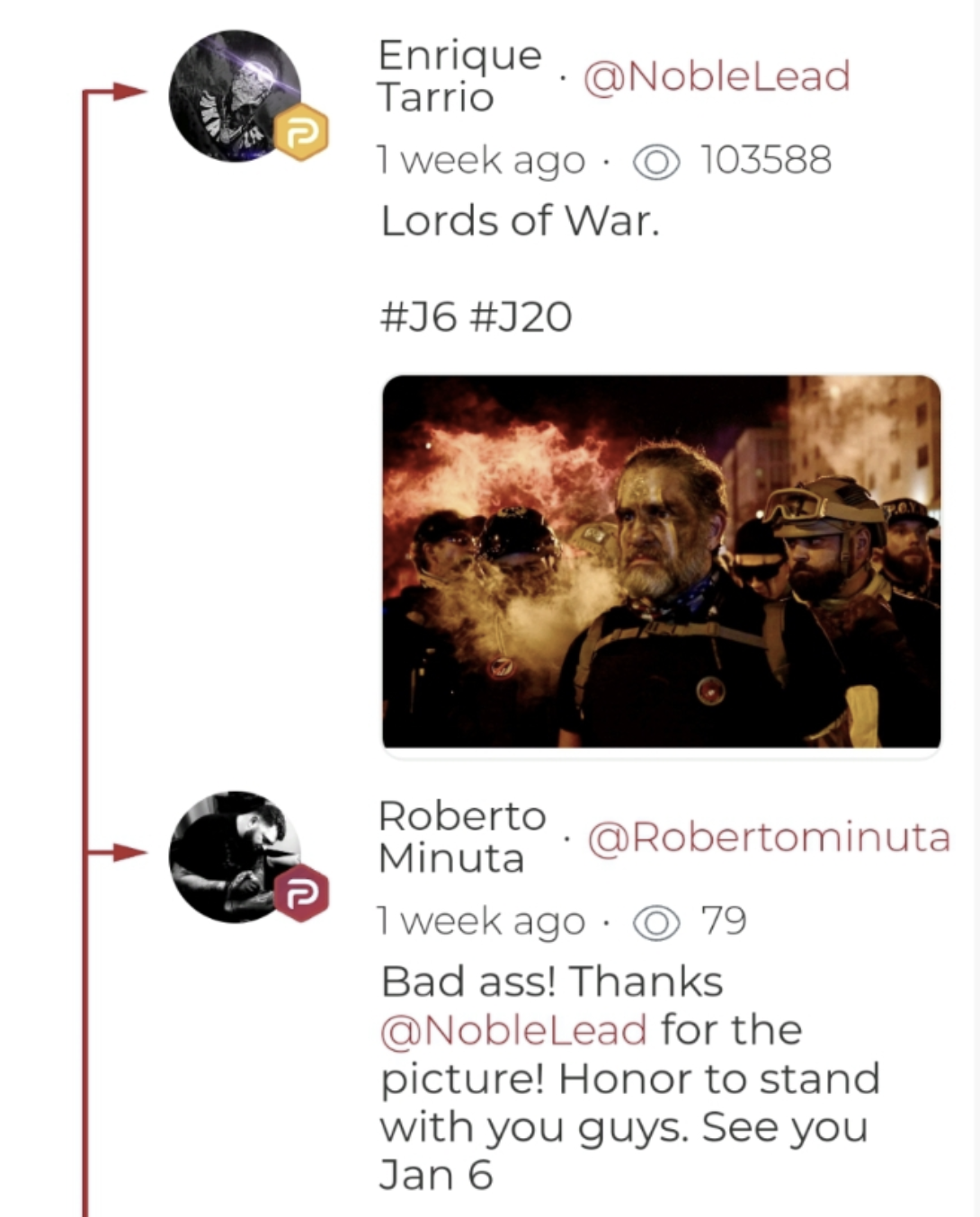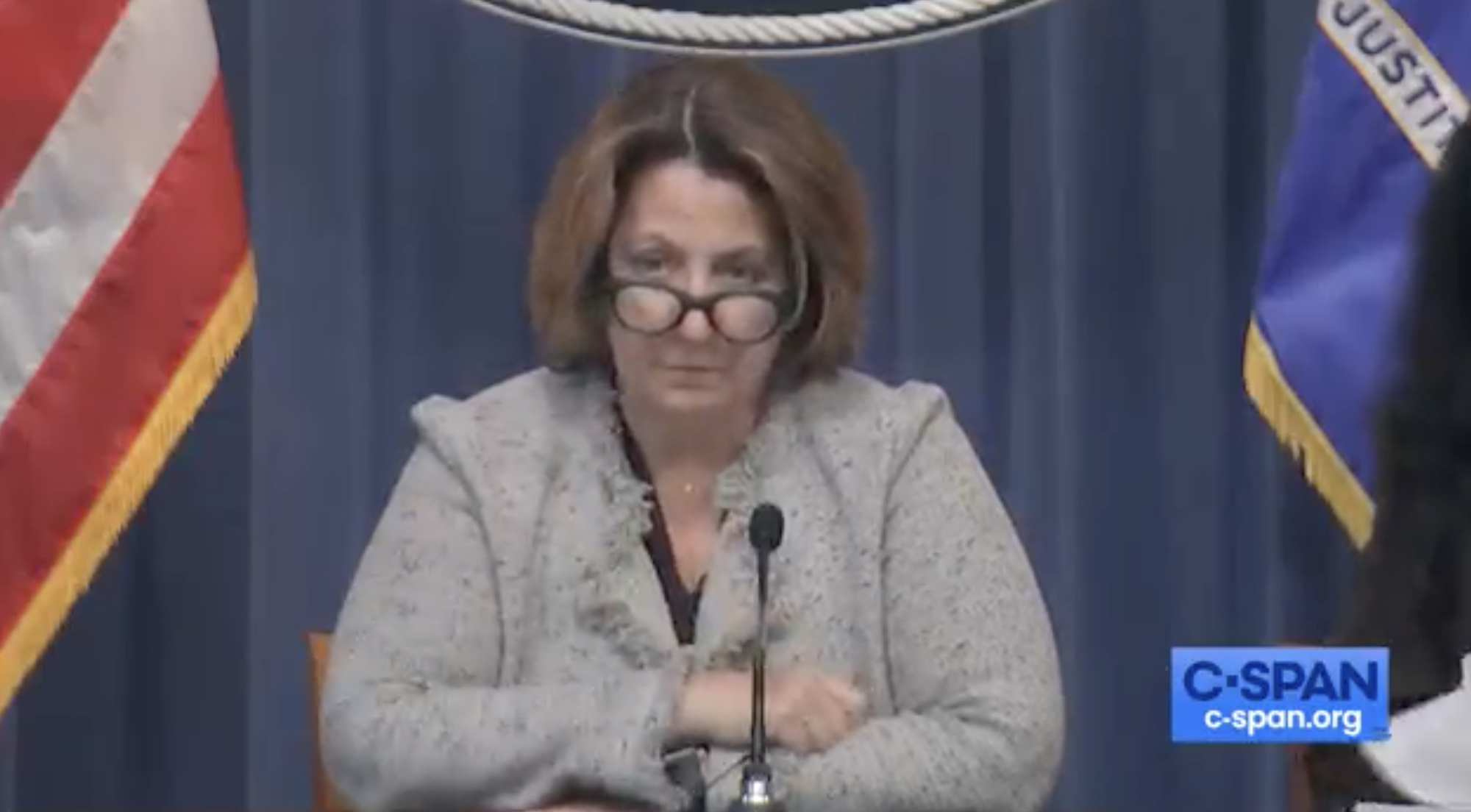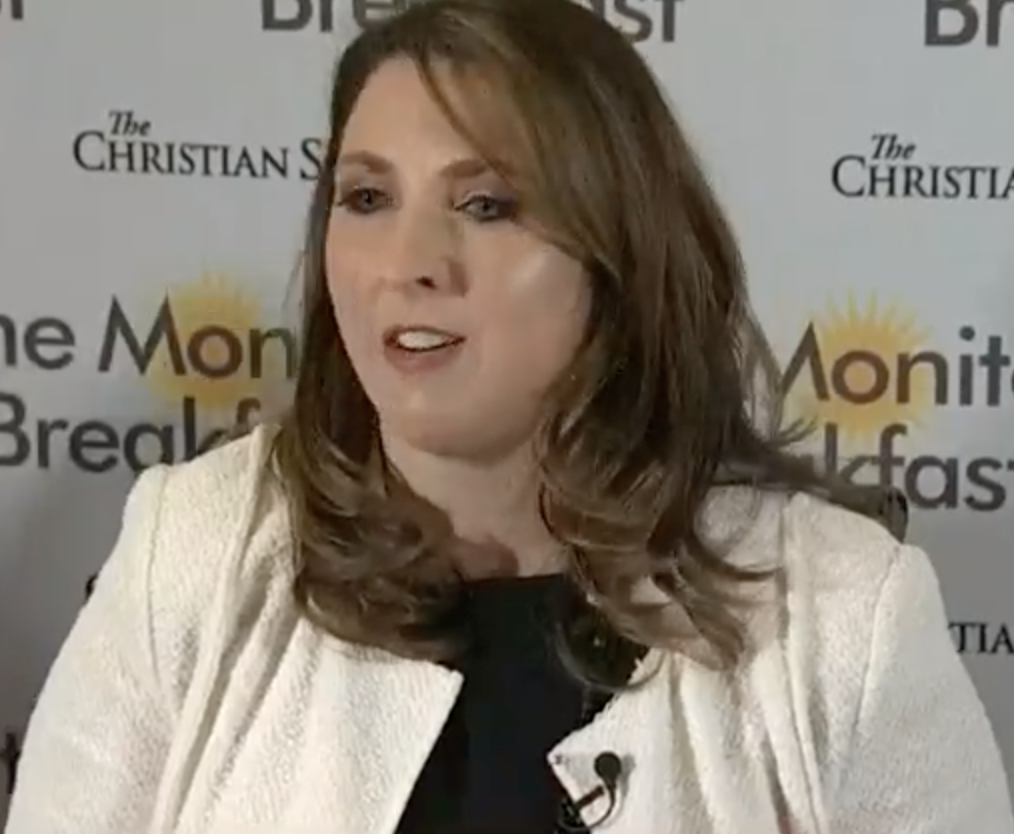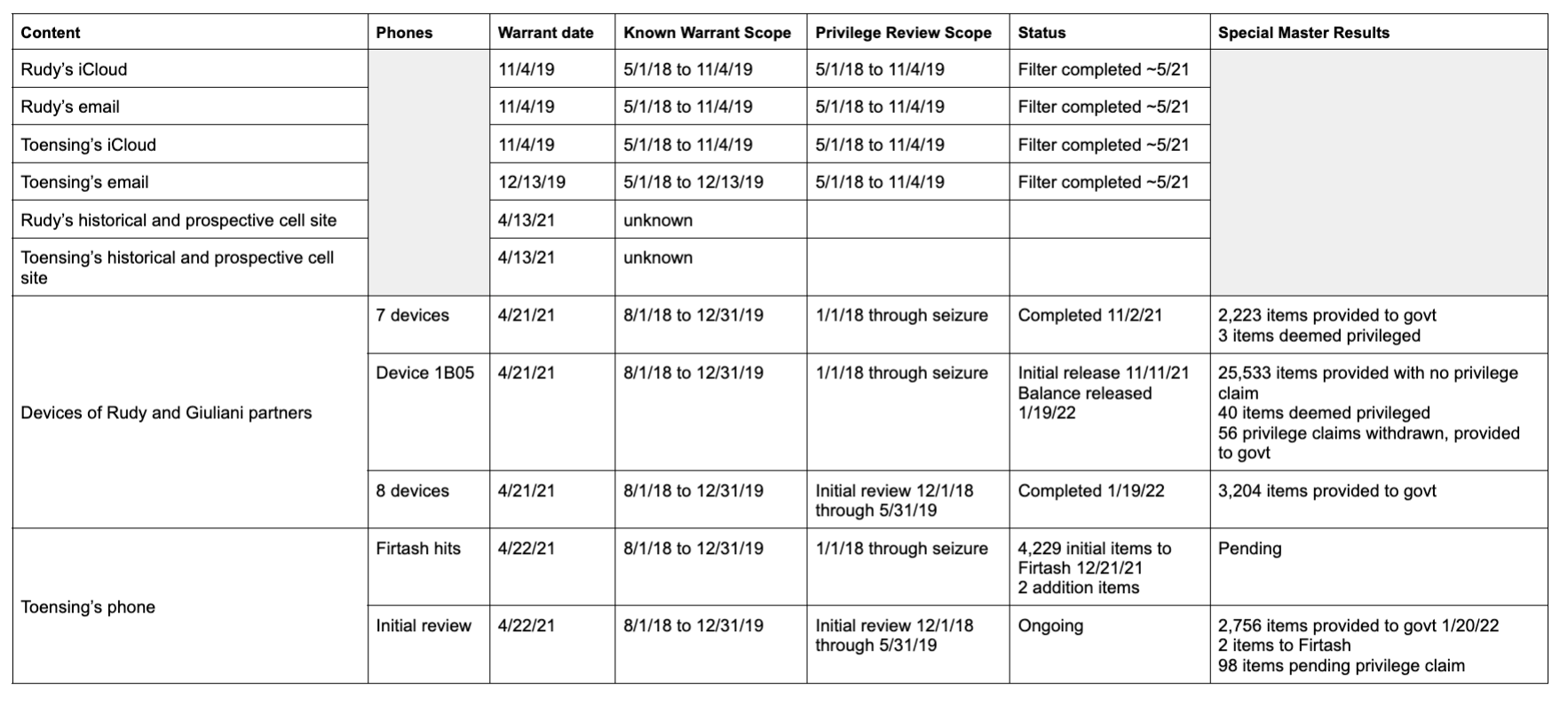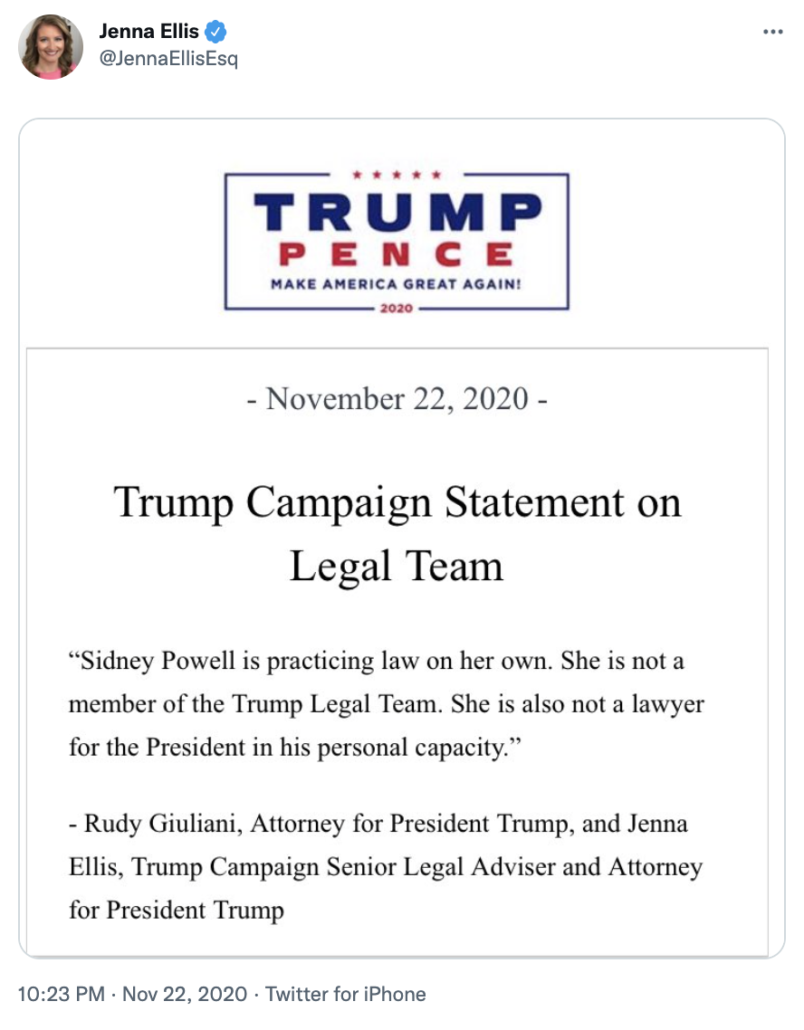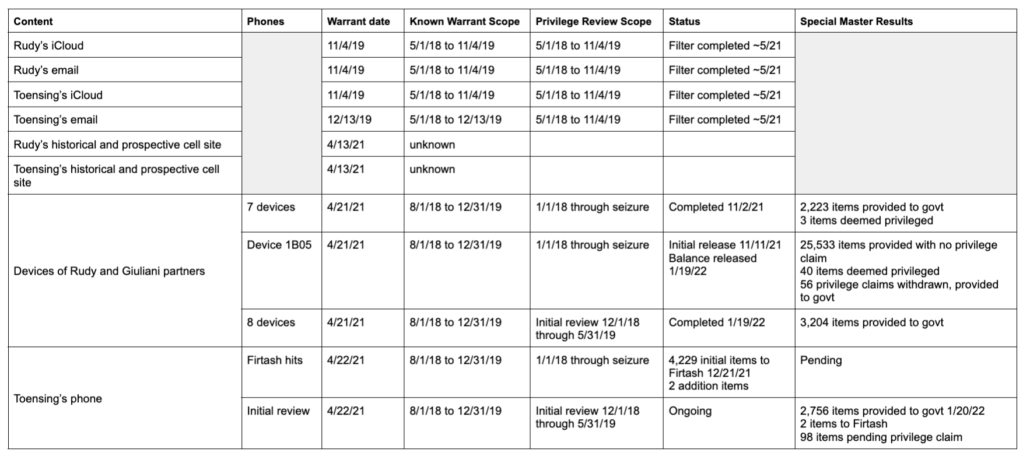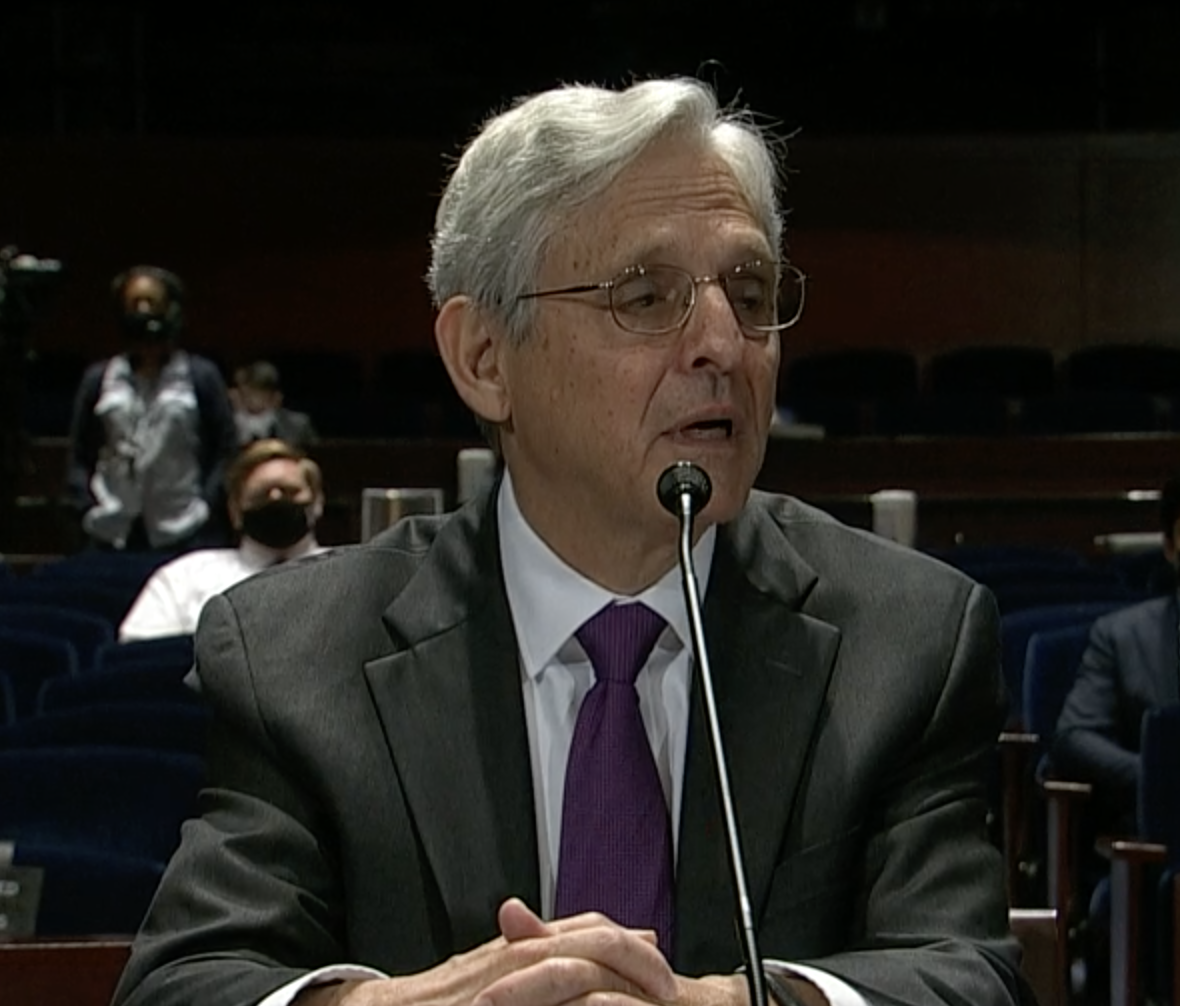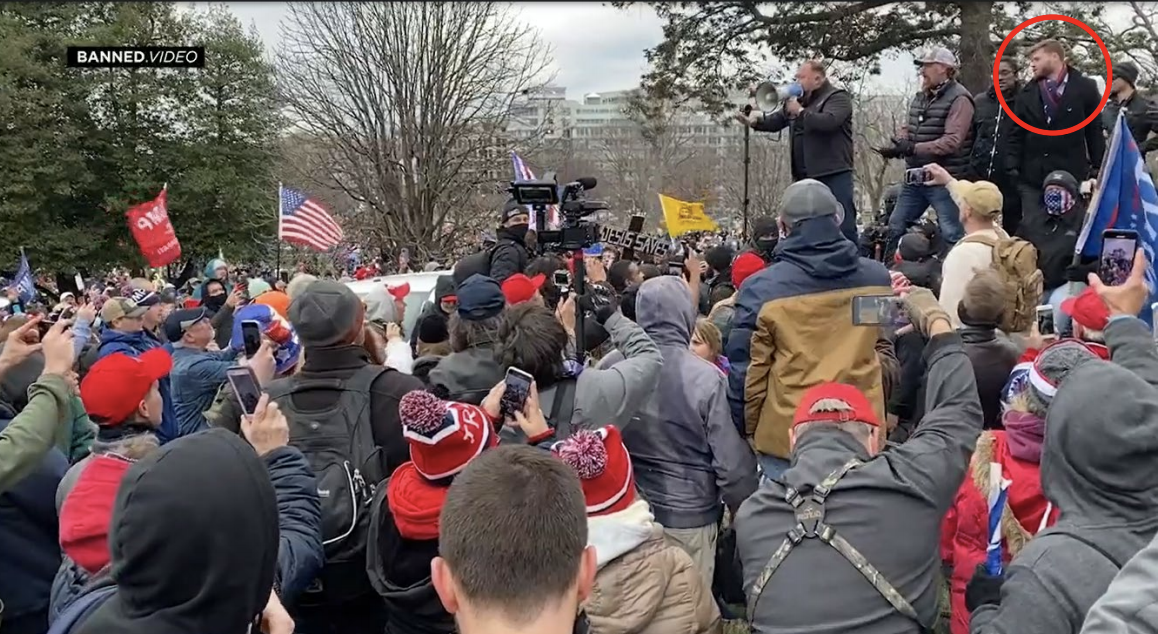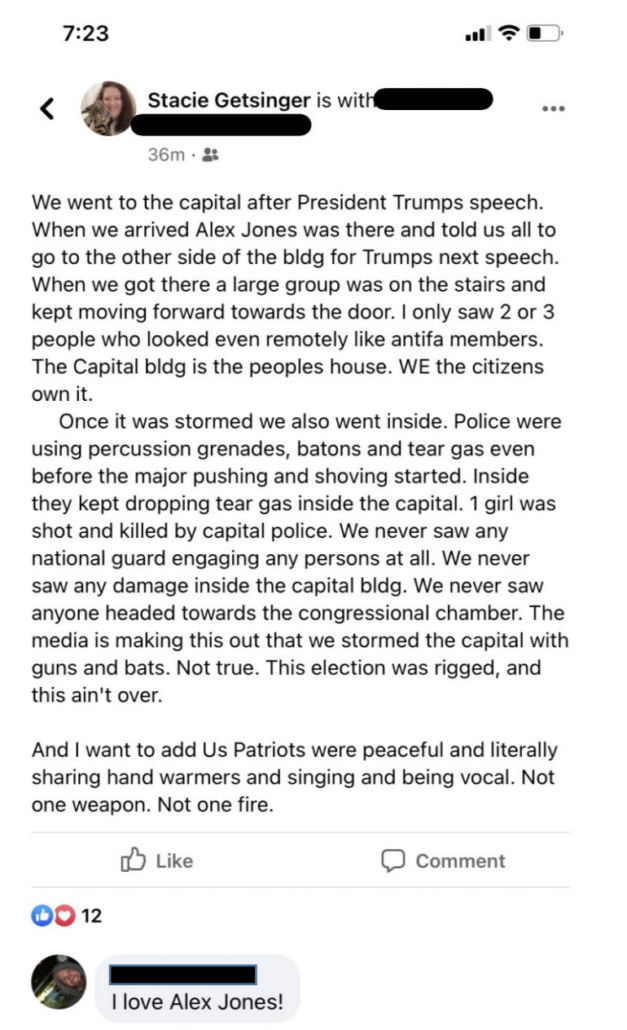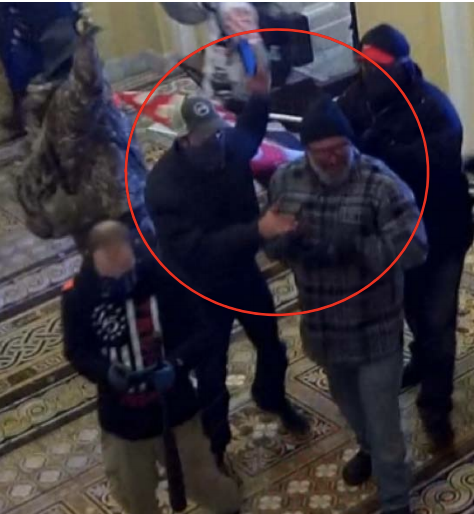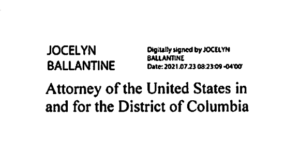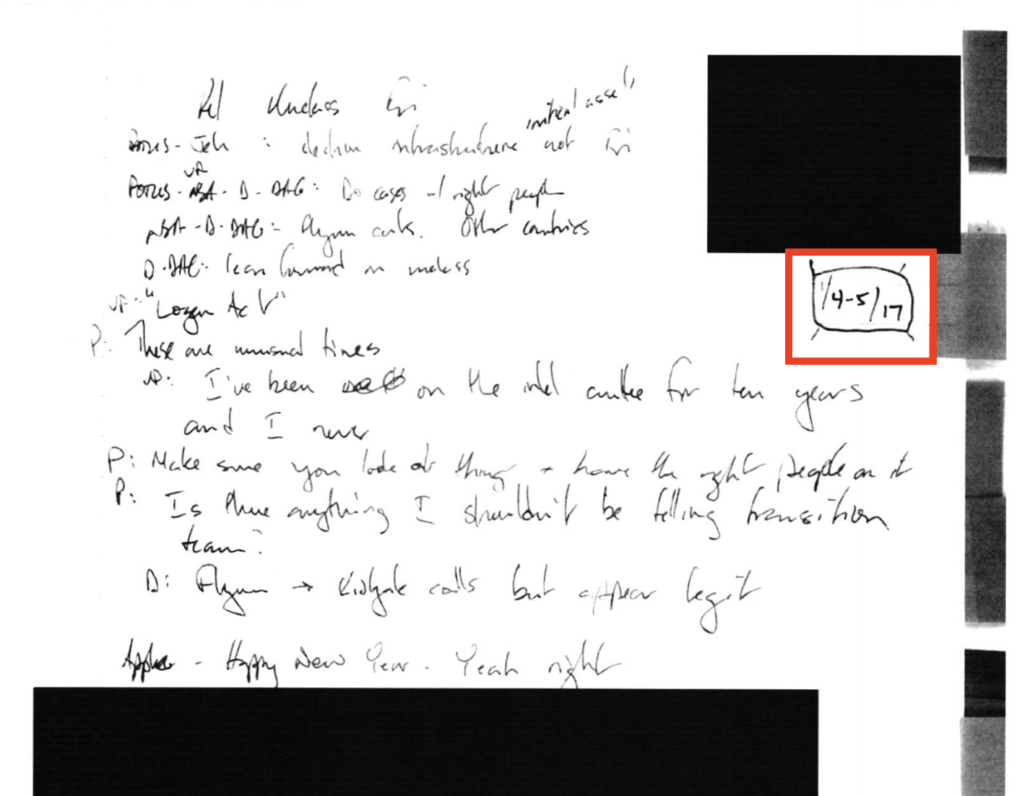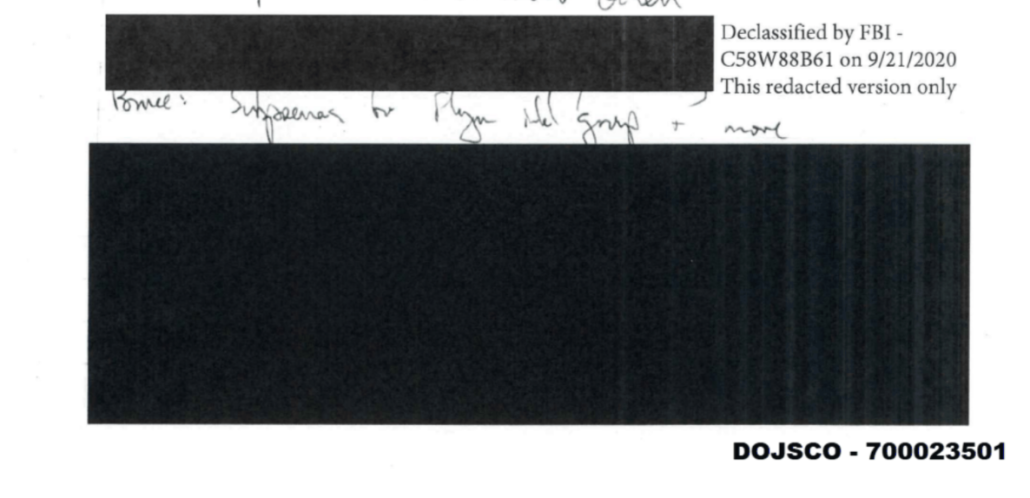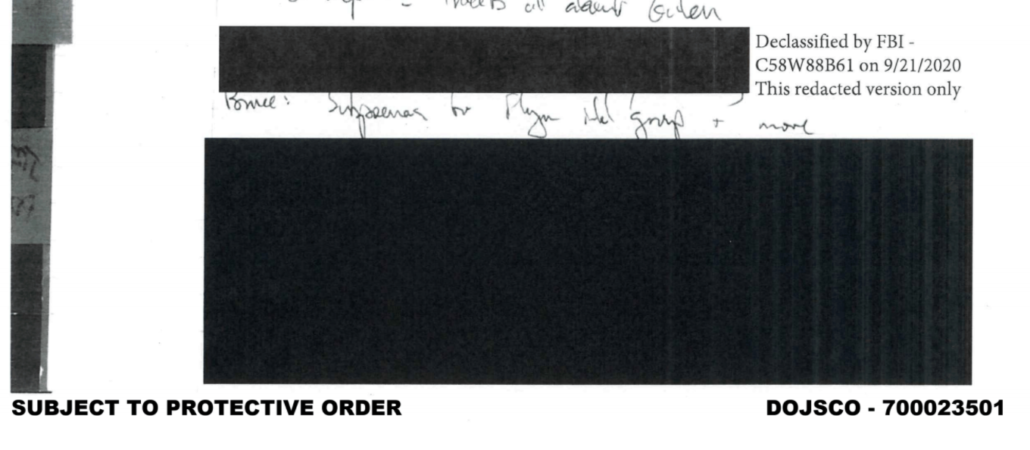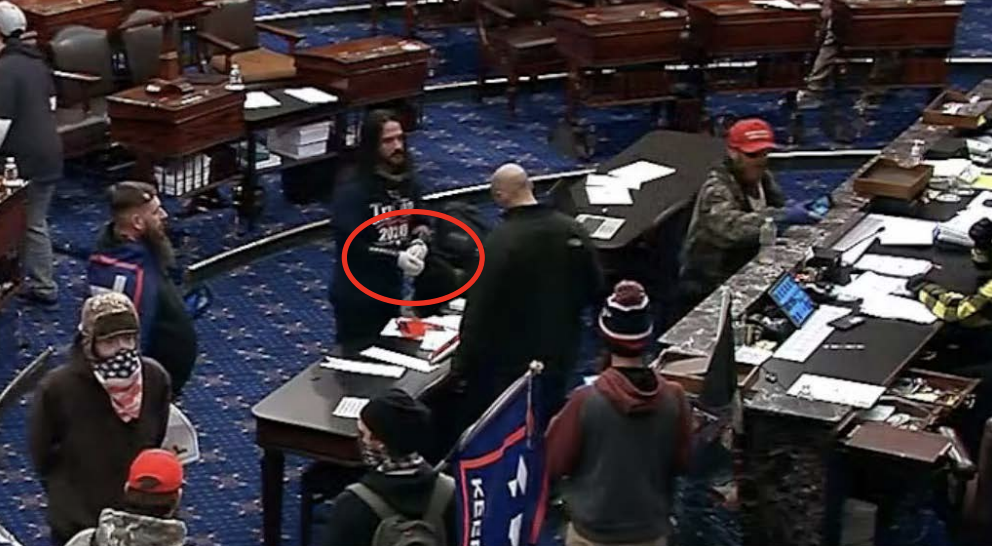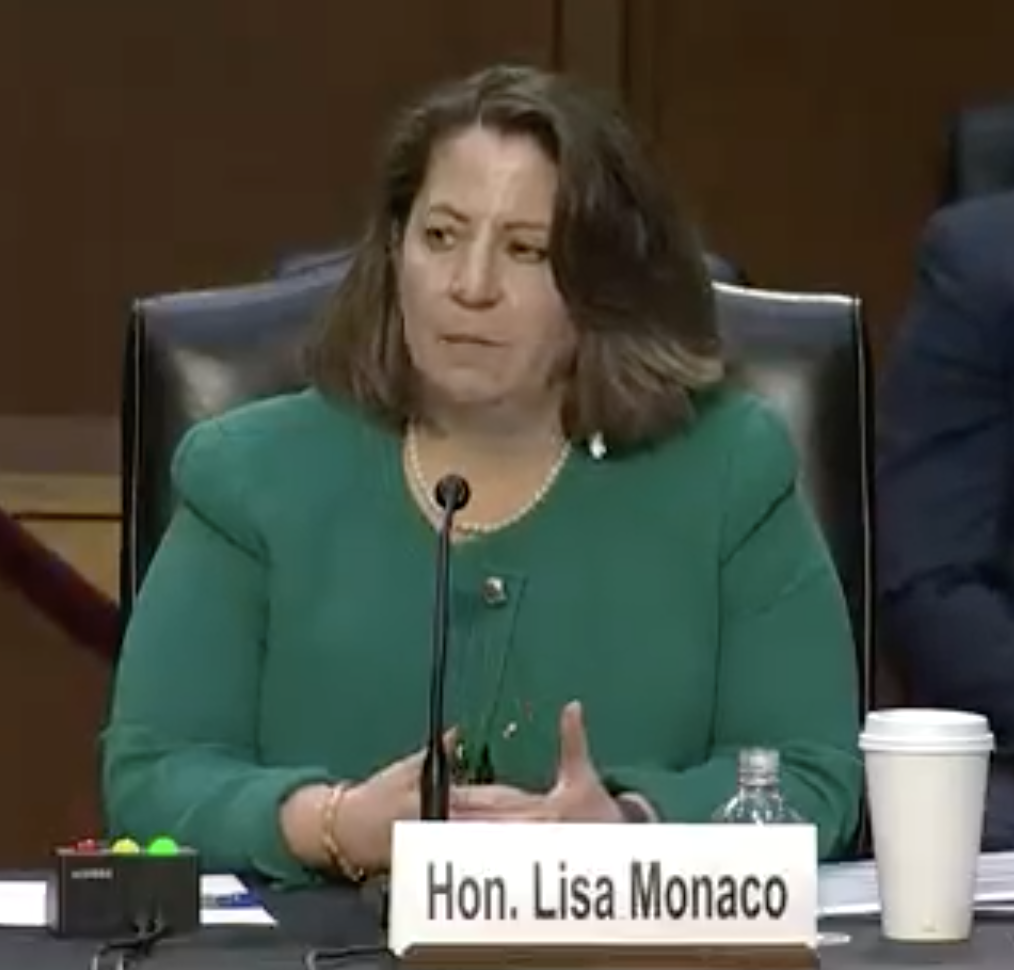I continue to have little patience for the people–many of them paid to expound as lawyers on TV–who spend their time whinging that Merrick Garland is not moving quickly enough to hold Trump accountable rather than spending their time doing other more productive things to protect democracy.
I’m not aware that any of these people has tracked the January 6 investigation closely enough to name those one or two degrees away from the former President who have been charged or are clearly subjects of investigation. Similarly, I’ve seen none do reporting on the current status of Rudy Giuliani’s phones, which after a Special Master review will release a bunch of information to prosecutors to use under any warrant that DOJ might have. Indeed, many of the same people complain that Trump has not been accountable for his Ukraine extortion, without recognizing that any Ukraine charges for Trump would almost certainly have to go through that Rudy investigation. The approval for the search on Rudy’s phones may have been among the first decisions Lisa Monaco made as Deputy Attorney General.
It’s not so much that I’m certain DOJ would prosecute Trump for his serial attempts to overthrow democracy. There are tea leaves that DOJ could get there via a combination of working up from pawns who stormed the Capitol and down from rooks referred from the January 6 Commission. But I’m more exasperated with the claims that there were crimes wrapped with a bow (such as Trump’s extortion of Ukraine) that Garland’s DOJ could have charged on March 11, when he was sworn in. Even the Tom Barrack prosecution, a Mueller referral which reportedly was all set to indict in July 2020, took six months after Biden’s inauguration before it was indicted. The January 6 investigation started less than eleven months ago; eleven months into the Russian investigation, Coffee Boy George Papadopoulos had not yet been arrested and he was still months away from pleading guilty, on a simple false statements charge. We have no idea how much deliberate damage Billy Barr did to other ongoing investigations arising out of the Mueller investigation, but his public actions in the Mike Flynn, Roger Stone, and Paul Manafort cases suggests it is likely considerable. As for the January 6 investigation, as I’ve noted, it took nine months from the time FBI learned that a Capitol Police Officer had warned Jacob Hiles to delete his Facebook posts until the time DOJ indicted Michael Riley on two counts of obstruction. To imagine that DOJ would have already indicted Trump on anything he might be hypothetically under investigation at this point, particularly relating to January 6, is just denial about how long investigations take, even assuming the subject were not the former President with abundant access to free or RNC-provided legal representation.
It’s not that I don’t understand the gravity of the threat. I absolutely share the panic of those who believe that if something doesn’t happen by midterms, Republicans will take over the House and shut every last bit of accountability down. I agree the threat to democracy is grave.
But there is no rule that permits DOJ to skip investigative steps and due process simply because people have invested in DOJ as the last bulwark of democracy, or because the target is the greatest threat to democracy America has faced since the Civil War. DOJ investigations take time. And that is one reason why, if people are hoping some damning indictment will save our democracy, they’re investing their hopes in the wrong place, because an investigation into Trump simply will not be rolled out that quickly. Even if Trump were indicted by mid-terms, the Republicans have invested so much energy into delegitimizing rule of law it’s not clear it would sway Fox viewers or even independent voters.
I can’t tell you whether DOJ will indict Trump. I can tell you that if they do, it will not come in time to be the one thing that saves democracy.
And so, because I believe the panicked hand-wringing is about the least productive way to save democracy, I made a list. Here are ten way that TV lawyers could better spend their time than whinging that Merrick Garland hasn’t indicted Donald Trump yet:
- Counter the propaganda effort to treat the Jan 6 defendants as martyrs.
- Explain how brown and black defendants actually faced worse conditions in the DC jail — and have complained with no results for years.
- Explain how DOJ has lost cases against white terrorists (including on sedition charges) in the past.
- Describe what really goes into an indictment, what kind of evidence is required, how long it takes, and the approvals that are needed to help people understand what to really expect.
- Emphasize the prosecutions/charges/investigations that have or are occurring.
- Describe the damage done by Trump’s pardons.
- Describe the way that even loyal Trumpsters will be and have been harmed as he corrupts the rule of law.
- Focus on the efforts of Chuck Grassley, Jim Jordan, James Comer, and Ron Johnson to undercut the investigation into Project Veritas’ suspected theft of Ashely Biden’s diary
- Explain how shoddy John Durham’s indictments are.
- Focus on the legal threats to democracy in the states.
Counter the propaganda effort to treat the Jan 6 defendants as martyrs
Whether or not Trump is ever charged with crimes related to January 6, the right wing noise machine has already kicked into gear trying to make it harder to prosecute other culprits for the January 6 riot. They’ve done so by falsely claiming:
- The event was just a protest like the protests of Brett Kavanaugh’s confirmation, a claim DOJ already debunked, in part by showing that the Kavanaugh protestors who briefly halted his confirmation hearing had been legally admitted.
- They’re being treated more harshly than those who used violence at BLM or Portland protests. DOJ has submitted multiple filings showing that such claims are based on cherry-picked data that ignore the state charges many of these defendants face, the better quality of evidence against Jan 6ers (in part because they bragged about their actions on social media), and the more heinous goal of the protest involved.
- Large numbers of non-violent January 6 are being held in pretrial detention. In reality, the overwhelming majority of those detained were charged either in a militia conspiracy or for assaulting cops. The exceptions to this rule are generally people (like Brandon Fellows or Thomas Robertson) who violated pretrial release conditions. Additionally, a good number of those accused of assaulting cops have been released.
- January 6 defendants are subjected to especially onerous treatment in jail. Many of the conditions they’re complaining about are COVID restrictions imposed on all detainees (though often more restrictive for those who, like a lot of January 6 defendants, choose not to get vaccinated). And in an inspection triggered by January 6 defendant Christopher Worrell’s complaints, the Marshals determined that the other part of the DC jail violated Federal standards, though the part in which the Jan 6ers are held did not.
- January 6 defendants are just patriots trying to save the country. In reality, of course, these people were attempting to invalidate the legal votes of 81 million Americans.
Again, all these claims are easily shown to be false. But far too many people with a platform are allowing them to go unanswered, instead complaining that DOJ is not doing enough to defend the rule of law. This sustained effort to turn the Jan 6ers into martyrs will achieve real hold unless it is systematically countered.
Explain how brown and black defendants actually faced worse conditions in the DC jail — and have complained with no results for years
As noted above, after Proud Boy assault defendant Worrell complained about the treatment he received in DC jail, the Marshals conducted a snap inspection. They discovered that the older part of the DC jail, one housing other detainees but not Jan 6ers, did not meet Federal standards and have started transferring those detainees to a prison in Pennsylvania.
What has gotten far less attention is that problems with the DC jail have been known for decades. Even though the problems occasionally have gotten passing attention, in general it has been allowed to remain in the inadequate condition the Marshals purportedly discovered anew because a white person complained.
This is an example, then, when a white person has claimed himself to be the victim when, in fact, it’s yet another example of how brown and black people have less access to justice than similarly situated white people.
This development deserves focused attention, most of all because it is unjust. But such attention will flip the script that Jan 6ers are using in an attempt to get sympathy from those who don’t understand the truth.
Explain how DOJ has lost cases against white terrorists (including on sedition charges) in the past
There’s a lot of impatience that DOJ hasn’t simply charged January 6 defendants with sedition or insurrection.
Thus far, DOJ has chosen to use a less inflammatory and more flexible statute, obstruction, instead. Obstruction comes with enhancements — for threatening violence or especially obstructive behavior — that DOJ has used to tailor sentencing recommendations.
The wisdom of this approach will soon be tested, as several DC Judges weigh challenges to the application of the statute. If the application is overturned, it’s unclear whether DOJ will charge something else, like sedition, instead.
But DOJ probably chose their current approach for very good reason: because sedition is harder to prove than obstruction, and in the past, white terrorists have successfully beaten such charges. That’s true for a lot of reasons, partly because the absence of a material support statute makes association with a right wing terrorist group harder to prosecute.
A cable personality whom I have great respect for — NBC’s Barb McQuade — knows this as well as anyone, as she was US Attorney when a sedition conspiracy case against the Hutaree collapsed. In that case, DOJ had trouble proving that defendants wanted to overthrow the US government, the kind of evidentiary claim that DOJ will face in January 6 trials, even as currently charged.
There are real challenges to prosecuting white terrorism. Some education on this point would alleviate some of the impatience about the charging decisions DOJ has made.
Describe what really goes into an indictment, what kind of evidence is required, how long it takes, and the approvals that are needed to help people understand what to really expect
In the period between the time Steve Bannon was referred to DOJ for contempt and the time he was charged, a number of commentators used the delay to explain what it takes to get an indictment (against a high profile political figure) that stands a chance of work; one good example is this column by Joyce Vance.
There have been and are numerous examples of similar delays — the Tom Barrack indictment and the Rudy Giuliani Special Master review are two — that offer similar teaching opportunities about the process and protections involved in indicting someone.
Due process takes time. And yet in an era of instant gratification, few people understand why that’s the case. If we’re going to defend due process even while trying to defend our democracy, more education about what due process involves would temper some of the panic.
Emphasize the prosecutions/charges/investigations against Trump that have or are occurring
Given the din calling for prosecution of Donald Trump, you’d think none of his associates had been prosecuted. As Teri Kanefield noted the other day, it would be far better if, instead of saying Trump had suffered no consequences for his actions, there was some focus instead on where he had.
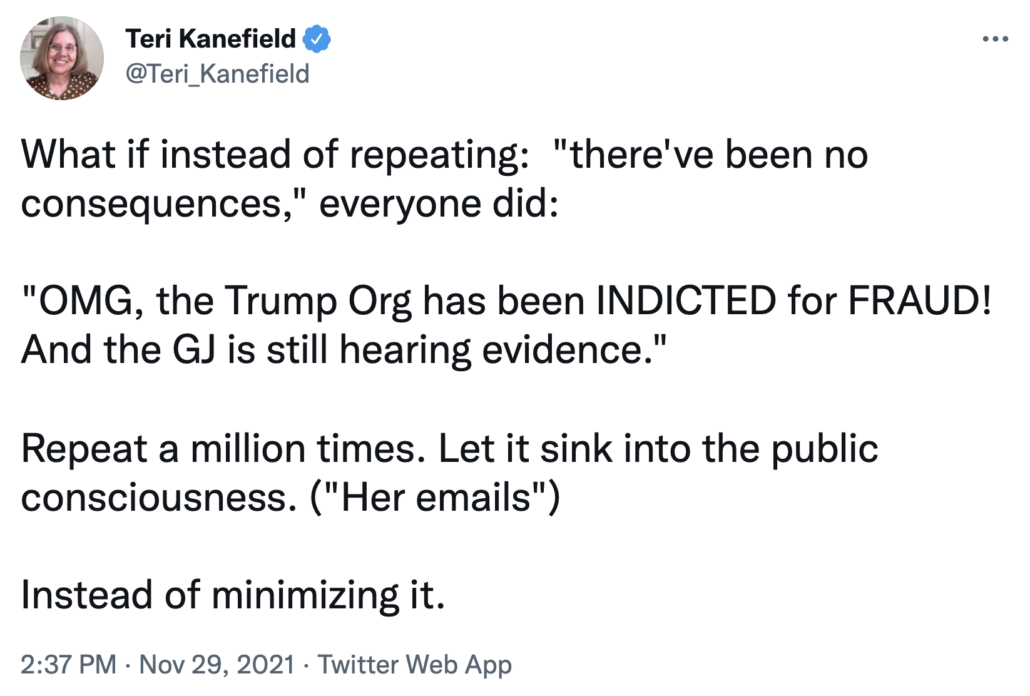
Trump’s business is currently under indictment with multiple investigations into it ongoing. His charity was shut down and fined for self-dealing. Trump’s Inauguration Committee will be civilly tried for paying above market rates to Trump Organization.
His Campaign Manager, his National Security Advisor, his Coffee Boy, his Rat-Fucker, and one of his personal lawyers were found guilty of lying to cover up what really happened with Russia in 2016. Several of these men (as well as a top RNC donor) also admitted they were secretly working for frenemy countries, including (in Mike Flynn’s case), while receiving classified briefings as Trump’s top national security aide. Trump’s biggest campaign donor, Tom Barrack, is being prosecuted for using the access he purchased to Trump to do the bidding of the Emirates. Another of Trump’s personal lawyers, Rudy Giuliani, is under investigation for the same crime, secretly working for another country while claiming to represent the interests of the President of the United States.
The sheer scale of this is especially breathtaking when you consider the projection the GOP has — successfully — focused on Hunter Biden for similar crimes. Even with years of effort and help from Russia, the GOP has not yet been able to prove that the President’s son’s influence peddling or potential tax accounting violated the law. Yet the GOP continues to focus on him relentlessly, even as the long list of Republicans who admit to the same crime continues to grow.
Trump has already proven to be the most corrupt president in some time, possibly ever. And instead of relentless messaging about that, Democrats are complaining about Merrick Garland.
Describe the damage done by Trump’s pardons
One reason why it’s hard to focus on all those criminal prosecutions is because Trump pardoned his way out of it. With the exception of Michael Cohen and Rick Gates, all the people who lied to cover up his Russian ties were pardoned, as was Steve Bannon and others who personally benefitted Trump.
Perhaps because these pardons happened in the wake of January 6, Trump avoided some of the shame he might otherwise have experienced for these pardons. But for several reasons, there should be renewed attention to them.
That’s true, for starters, because Trump’s pardons put the entire country at risk. By pardoning Eddie Gallagher for war crimes, for example, the US risks being treated as a human rights abuser by international bodies. The military faces additional disciplinary challenges. And those who cooperated against Gallagher effectively paid a real cost for cooperating against him only to see him escape consequences.
Paul Manafort’s pardon is another one that deserves renewed attention. That’s true not just because the pardon ended up halting the forfeiture that otherwise would have paid for the Mueller investigation, the cost of which right wingers claimed to care about. It’s true because Trump has basically dismissed the import of industrial scale tax cheating (even while right wingers insinuate that Hunter Biden might have made one error on his taxes). And finally, it’s true because Trump made an affirmative choice that a guy who facilitated Russia’s effort to undermine democracy in 2016, sharing information directly with someone deemed to be a Russian spy, should not be punished for his actions.
Finally, there should be renewed attention on what Trump got for his pardons. Did Steve Bannon and Mike Flynn pay central roles in January 6 in exchange for a pardon?
The US needs some means to prohibit such self-serving pardons like Trump pursued. But in the meantime, there needs to be some effort to shame Trump for relying on such bribes to stay out of prison himself.
Describe the way that even loyal Trumpsters will be and have been harmed as he corrupts the rule of law
Donald Trump pardoned Steve Bannon for defrauding a bunch of Trump loyalists. According to very recent reporting, Sidney Powell is under investigation (and being abandoned by her former allies) on suspicion she defrauded the thousands of Trump supporters who sent money to support her election conspiracy theories.
Meanwhile, the Republican Party continues to dump money into protecting Trump for his own crimes, even as Republicans lose races that could have benefitted from the money.
However, some RNC members and donors accused the party of running afoul of its own neutrality rules and misplacing its priorities. Some of these same officials who spoke to CNN also questioned why the party would foot the legal bills of a self-professed billionaire who was sitting on a $102 million war chest as recently as July and has previously used his various political committees to cover legal costs. According to FEC filings from August, the former President’s Make America Great Again committee has paid Jones Day more than $37,000 since the beginning of the year, while his Make America Great
Again super PAC has paid a combined $7.8 million to attorneys handling his lawsuits related to the 2020 election.
“This is not normal. Nothing about this is normal, especially since he’s not only a former President but a billionaire,” said a former top RNC official.
“What does any of this have to do with assisting Republicans in 2022 or preparing for the 2024 primary?” the official added.
Bill Palatucci, a national committeeman from New Jersey, said the fact that the RNC made the payments to Trump’s attorneys in October was particularly frustrating given his own plea to party officials that same month for additional resources as the New Jersey GOP sought to push Republican Jack Ciattarelli over the finish line in his challenge to incumbent Democratic Gov. Phil Murphy.
“We sure as heck could have used $121,000,” Palatucci told CNN.
Loyal Trumpsters are the victim of one after another grift, and that should be emphasized to make it clear who is really taking advantage of them.
And one after another former Trump loyalist get themselves in their own legal trouble. One of the messages Michael Cohen tried to share in his testimony before going to prison was that “if [other Republicans] follow blindly, like I have,” they will end up like he did, going to prison. Hundreds of January 6 defendants — some of whom imagined they, too, might benefit from Trump’s clemency (they still might, but they’ll have to wait) — are learning Cohen’s lesson the hard way.
Kleptocracy only benefits those at the top. And yet Trump’s supporters continue to aggressively pursue policies that will make the US more of a kleptocracy.
It’s fairly easy to demonstrate the damage degrading rule of law in exchange for a kleptocracy is. Except average people aren’t going to understand that unless high profile experts make that case.
Focus on the efforts of Chuck Grassley, Jim Jordan, James Comer, and Ron Johnson to undercut the investigation into Project Veritas’ suspected theft of Ashely Biden’s diary
The Project Veritas scandal remains obscure and may never amount to charges against PV itself. Yet even as it has become clear that DOJ is investigating theft, key Republicans Chuck Grassley, Jim Jordan, James Comer, and Ron Johnson are trying to shut down the investigation into that theft. Chuck Grassley’s efforts to do so are particularly noxious given that a long-term staffer of his, Barbara Ledeen, is a sometime co-conspirator of Project Veritas.
Republicans have undermined legitimate investigations into Trump, over and over, with little pushback from the press. This is an example where it would seem especially easy to inflict a political cost (especially since Grassley is up for re-election next year).
It would be far more useful, in defending rule of law, to impose political costs on undermining the investigations that commentators are demanding from DOJ than it is to complain (incorrectly) that such investigations aren’t happening. Merrick Garland (however imperfect) is not the enemy of rule of law here, Jim Jordan is.
Explain how shoddy John Durham’s indictments are
One of the complaints that David Rothkopf made in the column that kicked off my latest bout of impatience with the hand-wringing about Garland complained that Garland “is letting” Durham charge those who raise concerns about Trump’s ties to Russia, even while (Rothkopf assumes) ignoring Trump’s own efforts to obstruct the investigation.
We have seen that Garland is letting the highly politicized investigation of special prosecutor John Durham into the conduct of the Trump-Russia investigation continue (by continuing its funding). We therefore have the real prospect that those who sought to look into the Trump-Russia ties that both Mueller and Congressional investigations have demonstrated were real, unprecedented and dangerous might be prosecuted while those who actively sought the help of a foreign enemy to win an election will not be.
As I have noted, both of Durham’s indictments have been shoddy work, hanging charges on Twitter rants and other hearsay evidence.
And while there was some worthwhile criticism of the Michael Sussmann indictment (perhaps because he’s well-connected in DC), Democrats seem to take Durham’s word that Igor Danchenko — and not Christopher Steele or Russian disinformation — is responsible for the flaws in the dossier. Perhaps as a result, the legal experts who could point out how ridiculous it is to rely on a Twitter feed for a key factual claim have remained silent.
With such silence, it is not (just) Garland who “is letting [Duram’s] highly politicized investigation” continue unchecked, but also the experts whose criticism could do something to rein him in.
If the investigation is politicized — and it is — then Durham is a far more appropriate target than Garland.
Focus on the legal threats to democracy in the states
There has, admittedly, been deserved focus on the ways Republicans are chipping away at democratic representation in the states.
But that is where the battle for democracy is being fought. And in most of the states where Trump attempted to undermine the 2020 election, there are follow-on legal issues, whether it’s the investigation into the suspected voting machine theft in Colorado (including into a former campaign manager for Lauren Boebert), a seemingly related investigation in Ohio, or the effort to criminalize efforts to ease voting by seniors during the pandemic in Wisconsin.
Republicans are trying to criminalize democracy. That makes it all the more important to ensure that the call for rule of law remains laser focused on the criminal efforts to cheat to win, if for no other reason than to shame those involved.
The threat to democracy is undoubtedly grave. Republicans are deploying their considerable propaganda effort into legitimizing that attack on democracy (even while suggesting Biden has committed the kind of graft that Trump engaged in non-stop, classic projection).
In the face of that unrelenting effort, expert commentators who support democracy have a choice: They can defend the rule of law and shame those who have denigrated it, or they can spend their time complaining about the guy trying, however imperfectly, to defend it himself. The latter will make Garland less able to do his job, the former will help him do whatever he is willing and able to do.
Update: Added “suspected” to the PV bullet.

